
Locusts are various species of short-horned grasshoppers in the family Acrididae that have a swarming phase. These insects are usually solitary, but under certain circumstances they become more abundant and change their behaviour and habits, becoming gregarious. No taxonomic distinction is made between locust and grasshopper species; the basis for the definition is whether a species forms swarms under intermittently suitable conditions; this has evolved independently in multiple lineages, comprising at least 18 genera in 5 different acridid subfamilies.

Robinia pseudoacacia, commonly known in its native territory as black locust, is a medium-sized hardwood deciduous tree, belonging to the tribe Robinieae of the legume family Fabaceae. It is native to a few small areas of the United States, but it has been widely planted and naturalized elsewhere in temperate North America, Europe, Southern Africa and Asia and is considered an invasive species in some areas, such as the temperate east coast of Australia where the cultivar 'Frisia'(Golden Robinia) was widely planted as a street tree before being classed as a weed. Another common name is false acacia, a literal translation of the specific name.

The red goshawk is probably the rarest Australian bird of prey. It is found mainly in the savanna woodlands of northern Australia, particularly near watercourses. It takes a broad range of live prey, mostly birds.
The Australian Plague Locust Commission (APLC) is a joint venture of the Australian Government and the member states of New South Wales, Victoria, South Australia and Queensland, created in 1974 to manage outbreaks of the Australian plague locust, spur-throated locust and migratory locust in eastern Australia. With 19 staff members at its headquarters in Canberra and field offices in Narromine, Broken Hill and Longreach, it is jointly funded by the Commonwealth government and by the Australian states of New South Wales, Victoria, South Australia and Queensland.

The migratory locust is the most widespread locust species, and the only species in the genus Locusta. It occurs throughout Africa, Asia, Australia and New Zealand. It used to be common in Europe but has now become rare there. Because of the vast geographic area it occupies, which comprises many different ecological zones, numerous subspecies have been described. However, not all experts agree on the validity of some of these subspecies.
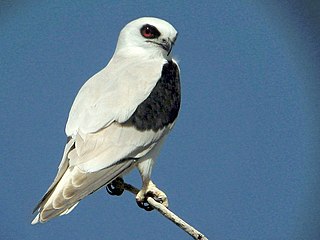
The letter-winged kite is a small, rare and irruptive bird of prey that is found only in Australia. Measuring around 35 cm (14 in) in length with a wingspan of 84–100 cm (33–39 in), the adult letter-winged kite has predominantly pale grey and white plumage and prominent black rings around its red eyes. Its name derives from its highly distinctive black underwing pattern of a shallow 'M' or 'W' shape, visible when in flight. This distinguishes it from the otherwise similar black-shouldered kite. This species is also the only nocturnal species within the order Accipitriformes despite few differences found in its visual anatomy to other closely related kites.

The spotted nightjar or spotted eared-nightjar is a species of nightjar in the family Caprimulgidae. It inhabits much of mainland Australia and has also been found in several Indonesian islands. Its natural habitats are open forests and woodlands, scrub, spinifex and tussock grassland, savannah woodland and mangroves.

The Australian crake , also known as Australian spotted crake, or spotted crake is a species of bird in the family Rallidae. It is the only species of Australian crake in the genus Porzana.
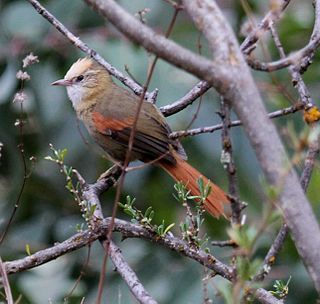
The creamy-crested spinetail is a species of bird in the Furnariinae subfamily of the ovenbird family Furnariidae. It is endemic to Peru.

The white-throated cacholote is a species of bird in the Furnariinae subfamily of the ovenbird family Furnariidae. It is endemic to Argentina.

The dark-breasted spinetail is a species of bird in the Furnariinae subfamily of the ovenbird family Furnariidae. It is found in Bolivia, Brazil, Colombia, Ecuador, and Peru.
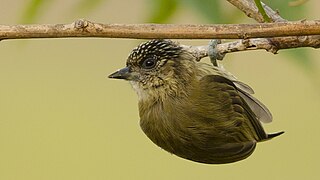
The olivaceous piculet is a species of bird in subfamily Picumninae of the woodpecker family Picidae. It is found from Guatemala south through Central America and western South America to Peru.
The whitefin swellshark is a species of catshark, belonging to the family Scyliorhinidae, endemic to southeastern Australia. It is found 126–554 m (413–1,818

The Australian plague locust is a native Australian insect in the family Acrididae, and a significant agricultural pest.

Gastrimargus musicus, the yellow-winged locust or yellow-winged grasshopper, is a common grasshopper in Australia. It only displays its yellow back wings in flight, when it also emits a loud clicking sound. When swarming, the adults become dark brown. They are sometimes confused with the Australian plague locust, though the yellow winged locust is "stouter and larger".
Scyllarus pygmaeus is a species of slipper lobster that lives in shallow water in the Mediterranean Sea and eastern Atlantic Ocean. It grows to a length of 55 mm (2.2 in), which is too small for it to be fished for food. The juvenile form was first described in 1885, with the description of the adult following in 1888 as a result of the Challenger expedition.
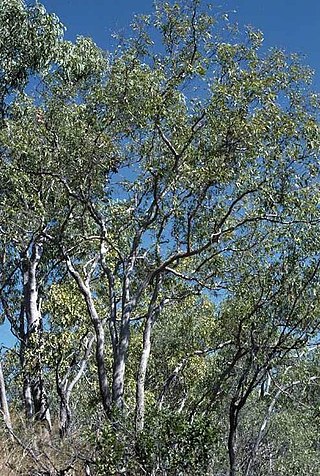
Corymbia jacobsiana, commonly known as Jacob's bloodwood or stringybark bloodwood, is a species of tree that is endemic to the Northern Territory. It has rough, stringy bark on the trunk and branches, lance-shaped to elliptical or curved adult leaves, flower buds in groups of three or seven, creamy white flowers and urn-shaped fruit.
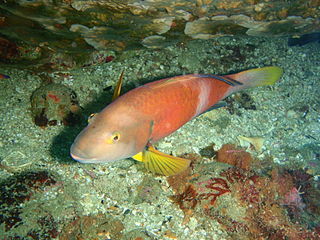
The blue-throated wrasse, also known as the bluehead, bluehead parrotfish, bluenose, bluenose parrotfish, bluethroat parrotfish, blue-throat wrasse, kelpie, lilac banded parrotfish, rocky bream, rocky cod, rotfish or winter bream, is a species of marine ray-finned fish from the family Labridae, the wrasses. It is found in the Indian and Pacific Ocean off the south-eastern coasts of Australia.
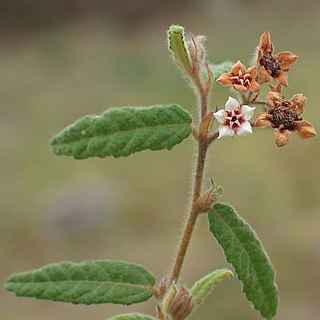
Commersonia breviseta is a species of flowering plant in the family Malvaceae and endemic to eastern Australia. It is a dwarf shrub with densely-hairy, egg-shaped to narrow elliptic leaves that are paler on the lower surface, and flowers with five white sepals with pink edges, five smaller pale yellow petals and dark red stamens.















